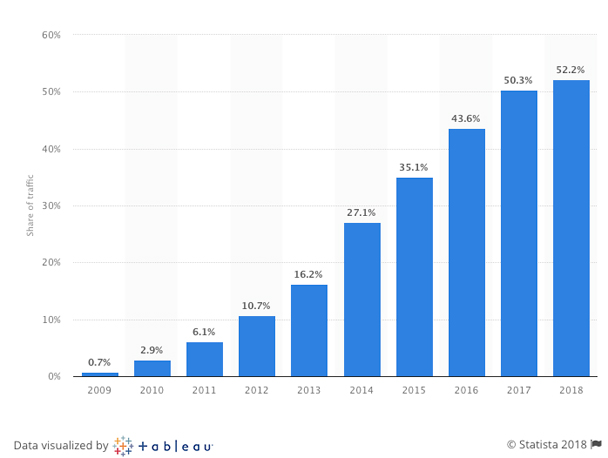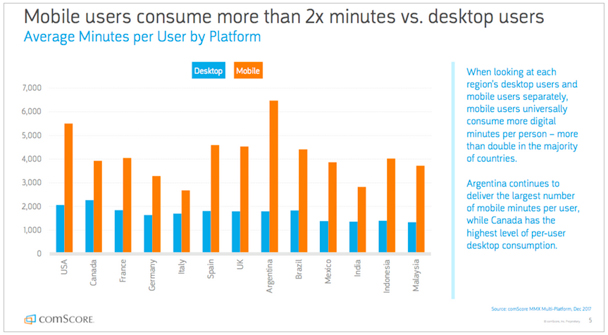In 2017, 50.3 percent of all Internet searches came from mobile phones and devices. In the elective medical industry, for several years now, we generally see that the majority of users looking at websites are on their mobile phones. We believe this on going trend is obvious—and on the rise. The question we put to you, in 2018, is: Is your mobile site doing its best to engage potential and existing patients?
Percentage of all global webpages served to mobile phones from 2009 to 2018

This growth in mobile phone use for Internet searches might explain why Google moved to “mobile-first indexing” in 2016, a strategy that favored well-designed mobile sites. In fact, since April 21, 2015, Google has considered whether or not you have a mobile responsive website as a major ranking factor. This algorithm update was so impactful, it was nicknamed Mobile geddon by web developers, as everyone scrambled make sure their mobile sites were up to snuff.
There are many reasons why you should care if your website’s mobile experience is the best it can be for potential and existing patients, but by far it comes down to this: In an age of smartphones, your mobile website needs to be super user-friendly to beat out the competition.
What happens when your mobile website is not user friendly? We’ve all given up on mobile websites that take too long to load, make it hard for us to navigate, malfunction, or make it difficult to find the information we are looking for. Potential patients will similarly give up on your practice if your mobile site isn’t well designed, organized, or engineered.
- Do users have easy access to the information they want with as few finger-taps as possible?
- Does your mobile site load within a few seconds?
- Is your font properly scaled to be readable on mobile phone screens?
- Is your site finger friendly? Is there adequate space between targets for users tap to navigate?
- Is your site “responsive?” Do you have a singular site engineered to automatically adjust to variable device screen sizes?
- Do your visual elements adjust to mobile screen size? Are they equally effective to an audience between desktop monitors and mobile phones?
- Is key content, brand, and messaging consistently presented between desktop and mobile layouts?
- Are your videos visible and playable on mobile devices?Are your interactive features and animations still functional on mobile?
- Do your mobile menus open and collapse easily, so as not to hide page content from users when they want it? Remember that menus share real estate with page content on tiny mobile screens.
- Are your calls to action clear, strategically designed, ever present, and easy to use? Is contacting the practice just a single click away at every turn for the user?
When MetaMed Marketing evaluates a new client’s existing website, we focus first on mobile and heavily rely on the human factor in testing its usability. However, certain analytics can point to problems, too. Is your mobile bounce rate (the percentage of users who leave your site after viewing just one page) healthy? Do users leave your website quickly? The better the user experience, the more trust is built. The more trust, the longer a person will stay on your content, and the more they read, the higher the conversion rate.Conversions can mean newsletter signups, calling or emailing the practice for a consultation, purchasing from your e-store, and more.

Mobile sites do better in:
- SEO
- getting more top-quality backlinks
- opportunities for social media sharing
- lower bounce rates and higher conversion rates
- and more…
At present, Google has 72 percent of the search engine market share, and therefore is most responsible for driving Internet search traffic to your site. If Google recommends responsive design, it’s best to make sure your website measures up as soon as possible. MetaMed Marketing is here to help make that happen.

Lindsay Dworkin
Lindsay Dworkin is an account manager at MetaMed handling creative aspects and administration of web development projects and online marketing campaigns for her clients.



